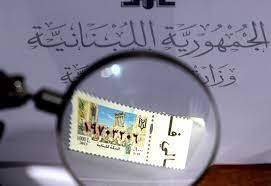The issue of the missing fiscal stamps in the Bekaa region took a legal turn this week, as the Public Prosecution has assigned the State Security apparatus in Zahle and Baalbek to investigate the matter and pursue those manipulating the prices of stamps in the black market. According to information, the State Security has begun investigations through multiple summonses that included the officials from the Ministry of Finance responsible for supplying these stamps, the licensed sellers, and some local leaders. There has been verification of the quantities of stamps available and the amounts sold daily, to ensure that no categories are being hidden, and consequently, that there is no price manipulation.
The aim of this step, according to judicial sources, is to ensure that citizens are not exploited due to their urgent need to complete transactions. However, it does not address the fundamental issue of the shortage of available stamps. The Public Prosecution's move came after an increase in complaints from citizens last week regarding their difficulties in obtaining certain categories of stamps, which opened the market to crisis traders, with some selling stamps worth a thousand and five thousand lira for 17,000 to 20,000 lira.
One licensed seller spoke of sales occurring under the desks of public institutions, with no desire from the buyers of the stamps to reveal their identities. They believe that if it were not for the scarcity of these stamps in their licensed offices, these individuals would not have dared to sell them on the black market. According to some licensed sellers, the quantity being supplied recently in the Bekaa region does not exceed five percent of what was previously received. In their view, this has led to the emergence of another type of crisis exploiters who purchase stamps from their offices and wait for the crisis to sell them at inflated prices. However, the justifications from the licensed sellers do not convince the citizens in general, who accuse each other of deliberately concealing the stamps to sell them to black market traders, a matter that the judiciary has requested to verify.
Conversely, licensed sellers have asserted that they are victims of the crisis just like the citizens. They explained that due to the current scarcity of certain stamp categories, they resorted to exchanging them for other available categories with some citizens, such as trading five or ten stamps of one thousand or two thousand lira for one or two stamps of the more available ten thousand lira category, in order to secure the one thousand and two thousand lira stamps for official administrative transactions, especially at the Lebanese University or the Ministry of Education, and for dealings with administrations that refused to resort to the procedure some have taken, which involved substituting the missing stamp categories with available ones. It is noted that whether the stamps are exchanged for available categories or purchased from the black market, the costs do not match the officially specified fees.
Moreover, licensed sellers explained that by purchasing stamps at their prescribed price from citizens who exchange them, their offices lose their designated commission of five percent. This remains true unless some offices resort to selling these stamps at prices higher than their designated value, thus pulling these offices into the black market as well. Ultimately, the citizen remains the biggest loser due to all these tactics employed to secure the stamps. This citizen finds themselves a victim of the doubled fees required for transactions, regardless of which party will benefit from these illicit profits.




